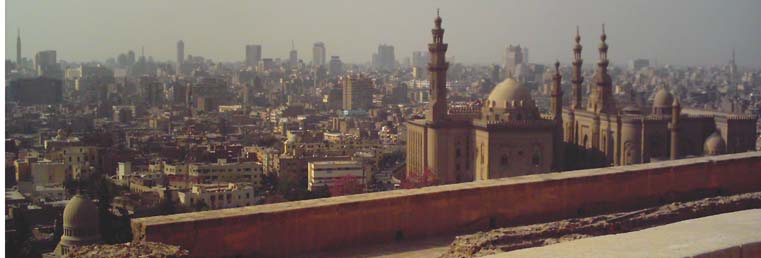
Crtd 07-04-27 Lastedit 15-10-27
Commander on Safari
Egypt, Netherlands, Southern France, Turkey, Netherlands, Egypt, Uganda
Cairo (what you will not too often find in a travel guide book)
I planned to travel to Cairo, then to Alexandria, take a ferry to Antalya (Turkish South coast), visit my friend Ben in the mountains 60 km North, buy a return ticket to The Netherlands to visit my friends and family there, and go the same way back, all in seven weeks. Option B, in case of delay, was to skip the Netherlands expedition, which was kept a secret there anyway. I left the dhow with Doi and Philemon as guardians. Commander on safari.

Photo: Cairo NorthWestward from the Citadel
I reached Cairo according to plan. It has 23 million inhabitants crammed in story buildings of 5 levels on average, built densely, usually only to give space for narrow roads. On both sides of the Nile, the city now reaches well into the desert. Children are unlikely to see much green except on the market and on their dinner plates. Water supply is a major concern and even in Uganda we see Egyptians monitoring the flow of the Nile, sometimes blasting obstructions in the river and at the lake outlets. Egypt has treaties, even with Uganda and Tanzania, on water use. Cairo's tap water is claimed to be drinkable, but due to heavy chlorine additions the taste is terrible. Coffee shops, however, will serve a glass of this water with your coffee. Yours truly is known to eat and drink just about everything offered anywhere, but this is too much for him.
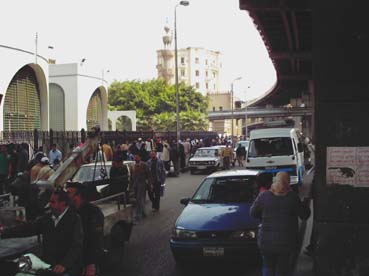
Photo: multistory highways in Islamic Cairo
I spent most of my three days walking in different parts of the city, leaving the tourist department for my stop on the way back from The Netherlands to Entebbe. The main rule for a blond 2 meter man turns out to be keeping clear of anybody approaching you saying "Welcome to Egypt! Where do you come from?" (swindlers), and never to pay more than a third of the price asked for anything you want to buy except if you buy far from places where you have seen any others looking non-Cairean. All roads, except the quiet side roads in the outskirts, have well maintained tarmac. Many elevated highways on pillars cross the city. On the picture above you see one elevated highway going over another another even higher one. Traffic jams are the rule. Whenever there is no traffic jam, things become dangerous indeed.
|
Photo: Midan Talaat Harb Except for the red car at the background, which is parked on the zebra,
already for several days, all cars on the picture drive fast, steering
round the crossing pedestrians. Traffic lights, red for cars, green for
pedestrians on the picture, are ignored by everyone, also by the pedestrians if
the lights change. By first crossing under coverage of local pedestrians at the
sides where the cars storm from, preferably pedestrians with little children, I
learned the crossing game: with his awesome speed, the car driver says: "I go
too fast to stop for you". By simply putting yourself on the road as a crossing
pedestrian you say: "I stand here, you have to find your way around me".
Standing in the middle of the road, you find yourself creating two lanes of
cars, one lane passing in front of you, another at you back, both keeping full
speed. Then you wait until some clogging lowers the speed of the car lane before
you and throw yourself in front of a car that leaves a hole before it of more
than 15 meters. He will jam his breaks for you if he feels unable to pass full
speed behind you, at least all cars did it with me during my short stay.
Crossings like these tend to have at least four policemen (indicated with
blue) on duty. Policemen do not assume any official air and tend to behave like
members of the Cairean family. On one occasion a little boy risked his life to
cross to the police standing middle of a busy roundabout. On arrival one
of the policemen bended over and kissed him. On another occasion my taxi driver
and the colleagues next to him started to growl at the traffic police holding
them and letting through other traffic on the crossing. The next step turned out
to be a slow forward move on the crossing to indicate that now they had shown
enough patience. The policeman gave way. |
|
Photo: Talaat Harb The Down Town shopping streets are crowded with men and women, in equal
ratio. Most women wear headscarfs, but in many variants
depending on what parts you leave visible: rare is: 1. nothing (netwire before
eyes), 2. eyes only and 3. area between the two eyes only. More frequent: 4.
nose and mouth visible, 5. forehead and/or chin visible, and equally rare: 6.
headscarf tied at rear side of neck so that cheeks and jaw bones are visible,
headscarf rolled and simply used as head-band - still a headscarf isn't it?
Finally: headscarf off, loosely hanging over the shoulders. At the rear,
headscarf can be tied in a knot, or hang loosely down. In the latter case the
scarf can be short (only covering the neck), or long, hanging deep down the
shoulder blades, suggesting beautiful long hair. More often than not, a lot of
care is spent to the make-up of the visible part of the face. The head scarf
variety is a continuum, but I found names for five different types. Note also
that between visiting say, a coffee house and your parents-in-law, you can
easily adapt the way you wear your headscarf. |
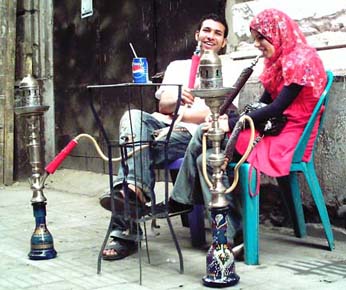
Photo: the Ahwas (coffee shop). Sheesha, not long ago in danger of becoming an old men's affair, made its come back.
Nowhere in Cairo you hear the familiar Western pop music crap. If anything, one plays, even in taxi's, men's solo voice love songs to God, in the Arabic scale. At prayer time this is drowned in the calls from the mosques. To that effect, mosques have even wired themselves up to their surrounding streets to connect a network of speakers. Fortunately, a few years ago a law was passed that all mosques should call for prayer at the exact time, since mosques tended to try to make themselves heard by starting to blast a little earlier or later then their competitors.
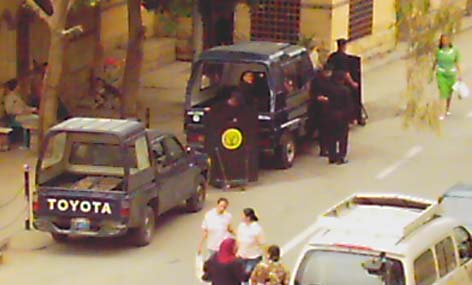
Photo: police with bullet sheets on wheels
Cairo has a very high profile police presence, but their behaviour is quite agreeable. Traffic police might even be less than official in the eyes of a foreigner (see above). Security police looks dangerous with their bullet shields on wheels, the small peep windows of which I have seen severely damaged by what must have been real bullets, but is systematically friendly and relaxed. One of their tasks is to guard a very old Jewish synagogue down town, which seems to be under restoration. There is a continuous presence of two Security Police cars, four bullet shields on wheels and twenty armed security police.

Photo: Dead Cairo: Western Cemetery
At the East side of Islamic Cairo, passing under a highway bridge, I entered
a desolate district.
"Where are you going? There is nothing there!" a friendly Cairean shouted to me,
so I felt sure this was going to be interesting. It turned out to be a cemetery
city where families from town have a plot surrounded by a wall, to bury their
dead inside. Usually there is a small one room house on the compound for tools,
and as a sun shed to drink tea during visits. The streets of this dead district
are not completely deserted though: unattended plots of extinct or emigrated
families have attracted the interest of squatters. At quite some places you see
the laundry hanging between the graves and children chasing each other around
them. There are enough people to allow for a simple shop on a street corner
where you can buy you tea and soap, or drink your coffee and smoke a waterpipe.
Alexandria
Time to head for Alexandria and find my ferry to Antalya (Turkish South coast) to visit Ben. See Surfboard: Ben). You go by train through the Nile delta to the Mediterranean coast. The train ticket is in Arab. The conductors do read Arab, but are in the age class needing reading glasses and do not have one, so it requires some wit to find your seat.
|
By the way, about writing: |
The Nile delta is nicely green, most of it grows crop. There are cows but not many. Having been warned for cruelty towards animals in Egypt, I was surprised to see a woman in the field brushing her cow. Horse and donkey drawn carts outnumber tractors. The village farms are unattractive bunkers made of concrete frames filled with bricks. No countryside to long for.
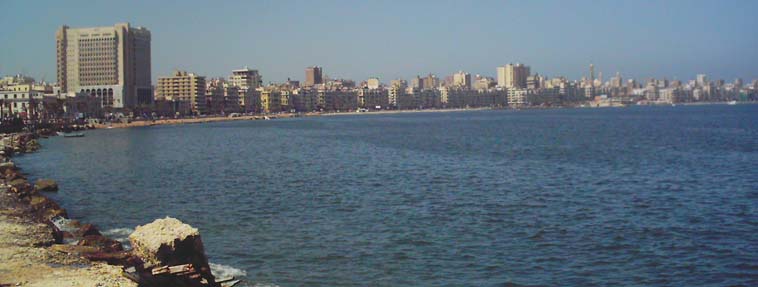
Photo: Alexandria, main port of Egypt: no ferries to anywhere (neither from any other Mediterranean ports in Egypt).
The travel agency seems to be a favourite business for Egyptians. There is an astonishing density of them. For the Hadj? Every single one I visited in Alexandria maintained emphatically that there were no ferries going anywhere from the Mediterranean coast of Egypt. This ran counter scarce information on internet and obtained by Ben in Antalya. Pressing further, I was told that there might be some services in summer. Trying the harbour for a trip on a cargo ship, I was chased from the heavily guarded premises. I was lucky to find an English speaking shipping handler in the harbour caf�, who was ready to make some calls. No cargo ships to Southern Turkey, and moreover, an immense paper work to get a passenger on. Flying? More expensive than to The Netherlands. I decided to go there first and see.
Netherlands, France
After ringing at my parent's door, it took my mother five seconds to realize it was me. Very satisfactory. What followed was a week of visiting friends, then a trip to Southern France with my friend Bert, who spend his youth, like me, in the famous village of Veendam, and who is, like me, a retired philosopher with a tendency to bankruptcy due to a liking of good cigars.

Photo: Puy Chevrol, Southern France, retrieving my cabin (left, snow in April!) and running 10 km (right). Bert (65), finished 10 minutes ahead of me.
We went there to see what was left of my car, parked there during two winters, and to retrieve my moveable cabin from a plot that Bert recently sold. We brought the cabin to a farm near paraglider sites in the French Alpes and took my car, in good state, to The Netherlands.
Time for my mother's 83d birthday party
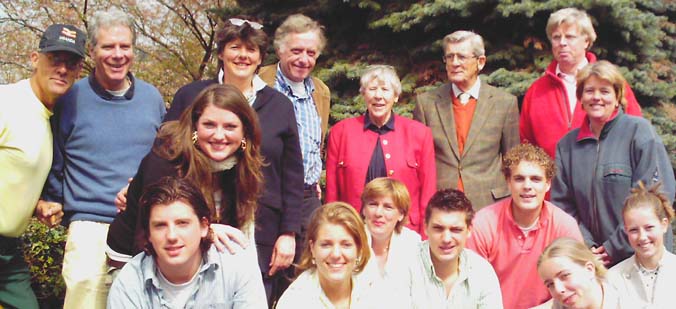
Photo: my mother's birthday party, all children and grandchildren present!
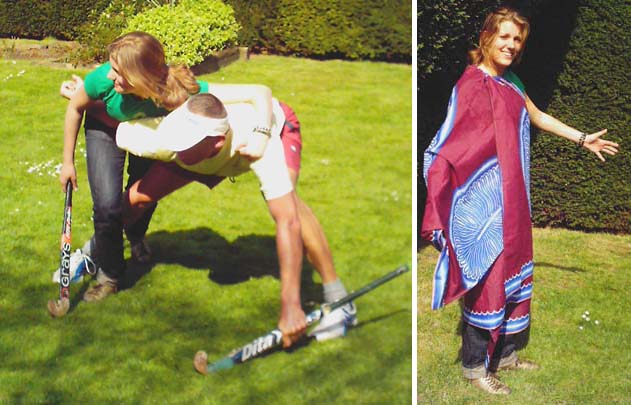
Photo: traditional garden hockey on my mother's birthday party, my favourite niece in her outfit presented by Doi
Visiting Ben, Kocaaliler, Southern Turkey
Off season air tickets to Antalya, South Turkey, are astonishingly cheap. On
arrival in Kocaaliler (3000 inh. 650 m), I could not pay the bus fare because
this had already been done for me "This is Turkey". The man told me to follow
another man who would bring me to Ben.
"How do you know I am going to visit Ben?"
In the minds of the bus passengers this simply had been the only possibility!
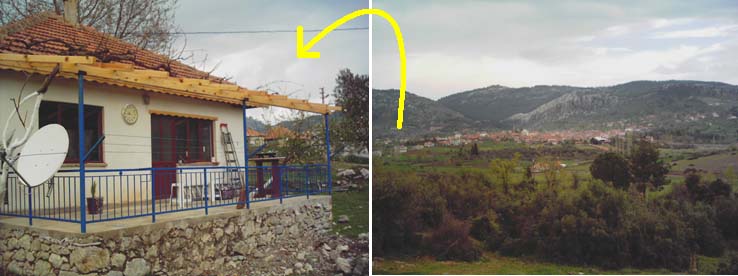
Photo: left: Ben's front (East) veranda, right: the same from a far distance with Kocaaliler (3000 inh.) on the right (North) side
Ben, a born loner, lives in this village already for over three years. Turkish language is difficult. He could easily have entered in daily exercise with the children passing on their way to school, trying their English on him: "What is you name?", "What is the time?". Instead, he decided to mount a clock on his house to have a permanent non verbal answer. His Turkish is good enough for shopping and the principles of moving around but since he does not follow conversations his luck is that the neighbouring farmer's son is an English teacher, who helps him solving problems and finding things and people he needs. He retired there early and has, like me, developed a distinctive skill in doing nothing. By way of distraction he exercises electronics, the craft to which he owes his savings, watches TV, operates his computer and pets his three cats, a mother and two kids.
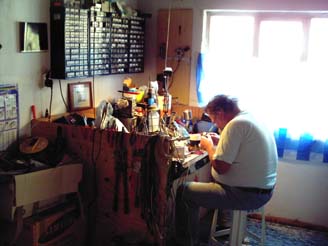
Photo: Ben at home in characteristic pose soldering electronic parts on a printbloc.
In a recent drama, Ben decided to have his cats, three ladies, sterilized.
Through his interpreter a vet volunteered. Not realizing Turkish country cats
tend not to be treated by vets but live and die at will of fate and people, and
the need for sterilization of any animal is not likely ever to be felt, Ben let
the vet embark on the operation. Two cats died immediately on the table, the
third one, the only one for which he had to pay, was in a weak and confused
state at my arrival. It needed care for broken stitches but the vet feared
to reappear. The cat survived this unhappy cross cultural incident with - no
villager there would believe me if I had the Turkish in me to tell - fresh
chicken and beef cut small.
On the veranda. All passers by greet. Cars hoot. We wave. In my six days with
Ben I made an all time personal wave record. The dress code is not unlike the
one in the the Nile delta: men in Western trousers, shirts, caps, women in wide
trousers, big woolen pullovers, head scarfs walking around with a few goats,
sheep, cows. But unlike the Nile delta the Turkish mountain agriculture is
approximately motorized. Head scarfs in Kocaaliler (3000 inh.): 100%. In the
province town Bucak (30 000 inh): 50%, in Antalya: 5% (Cairo 98%). Hospitality
and friendliness in Kocaaliler was paramount. We were invited for dinner at the
neighbour's, where I succeeded to have some communication using pen and paper to
make drawings and write figures (fortunately for me they do not use the Arab
writing system but Western number and letter signs since the profound reforms of
Turkey by Kemal Ataturk starting end of World War I). Also we heard sounds of a
marriage in town and walked there. We were given chairs at a table, newspapers
were spread en covered with lovely traditional dishes. We got bread and a spoon
(no plate), and were supposed to eat. New dishes were brought when it was
suspected we could still swallow more. Men celebrated at the front side of the
house with a male band. Women at the rear side in a tent from where we also
heard a band, with a female voice. Traditional Turkish country music, of course.
Ben does never long back to The Netherlands. Instead, he dreams of building a
house on one of the hills surrounding Kocaaliler's plane, to have a nice view
and cooler winds in summer. He feels more should be said about him and Turkey
than I did here, so I gave him a free page (click here)
which he framed in his very own characteristic way (in Dutch).
Return
Back to The Netherlands to park off my car, prepare for my flight back to Cairo and a last visit to Bert and his wife Inge. I decided not to take cigars for a change: Inge does not smoke and why not please her for once. Bert however, unexpected by me, threw in a heavy weapon: today was his 65th birthday. When I told him to understand we had to pay a visit to the cigar shop he diplomatically protested, but of course after half an hour stood with me in the wet room.
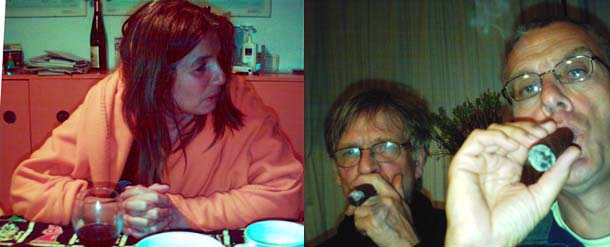
Photo: Right to left: me, Bert and his wife Inge, celebrating Bert's 65th
birthday.
(Bert and me celebrating most - Inge does not smoke).
Take off. No clouds over Europe until the Adriatic. Germany, I clearly saw, is now completely full. No more space for anybody there. Yet, the German government, and others too, are busy financially stimulating procreation. In general, though I thought this was impossible, the European folly in ideas, policies and procedures has increased in the two years of my absence, but I noticed my irritation about it is decisively down. New appreciation arose, for instance for being able to camp outside without an alert guard, armed with a good assault rifle, next to your bed.
Tourist Cairo (what you will not too often find in a travel guide book)
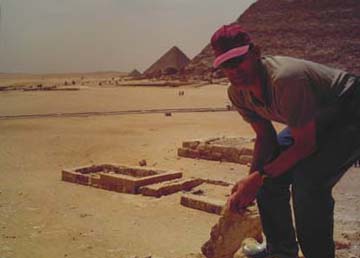
Photo: the proof: I really was there
Since I had already wandered through Down Town Cairo, Old Cairo, Islamic
Cairo and Dead Cairo, time had come for Tourist Cairo. The first thing to note
is the dress code: ultra short skirts and petticoats, naked backs displaying
tattoos and nose rings remove all doubt: these are the voters whose
representatives in the parliaments of the European countries insist emphatically
on the need for Arab immigrants to adapt to the European ways of life.
With foreign behaviour also local behaviour sinks: "Welcome to Egypt. Where do you come from?".
"Access to the pyramids 50 Pounds!" When you reach the pyramids there is another
booth: "Access to the inside of the pyramids, 100 Pounds!", and who knows how
much you have to pay to get out. Anyway a guide book reports about fierce and
nervous negotiations between a tattooed and nose-ringed European woman and a
camel owner after a round trip. She was still sitting on the camel and the owner
would not let the camel sit before an agreement was reached. I found there is no
fence, nor an entree fee booth for travelers arriving from the Sahara side as
shown in the picture above. Curiously, coming from the wrong side I overlooked
the sphinx and had to ask police (on white camels with their number burnt on the
rear right leg) for it. Indeed, the sphinx is much smaller than I thought and
built in a depression, at least that is how it looks of you come from the wrong
side. Later in the Egyptian Museum, I found that these pharao's must have been
about 1.30 m tall, seen from their thrones with foot supports, so in terms of
body size these pyramids are even 30% taller! The prices of water bottles: 5 Egyptian pounds on the pyramid premises, go
down 1 pound every 500 m walking in the direction of the outskirts of East
Cairo. After 1.5 km water bottles are down to the normal market price of 2
pounds.
I went to Coptic Cairo on Sunday, hoping at least to find some Copts there. I finally had learned to use the subway (signposts mostly Arabic), reducing my travel cost from 10 pounds (tourists 30 pounds) to 1 (one) pound per trip. But no Copts. Only tourists, mainly interested in a special entrance leading to, as a huge signpost claims, a "place where the holy family once spent the night".
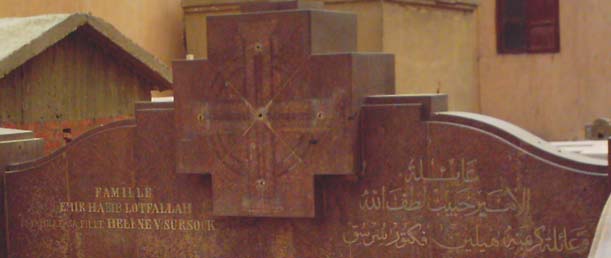
Photo: puzzling grave on a Coptic grave yard
This picture shows a grave on a Coptic grave yard. Copts are Christians in Asia Minor and Africa who never have been ruled by Rome or Byzantium. But the grave has a French inscription. There was a lot of French cultural influence in Egypt from the time of the Napoleon to independence after the Second World War. Caf�'s and restaurants often wear French names, and have a French flavour inside. Down Town Cairo could be taken for an old quarter of Grenoble, Bordeaux or Paris, with its five story "immeubles", balconies and windows with heavy ornament, and including the typical elevator, its shaft unprotected by walls so you see it passing at all levels in the stairwell. The puzzling thing of this grave is that it reads "FAMILLE EMIR....". Not many people will expect an Emir's family's grave on a Coptic grave yard. A Coptic Emir?? Anyway, the text is also carved in Arabic. But the holes and the shades in the middle part suggest there has been a cross, probably made of some kind of metal, mounted on the marble which has been removed. Why? By whom? From other graves, with Greek inscriptions, it sometimes looks like Greek orthodox people in Egypt also have chosen this graveyard as theirs, but this is doubtful because there have been major tensions between Copts and Greek Orthodox Christians all through history.
Then, it was time to confirm my flight at one of the many Egyptian Airways
agents down town.
"We charge 15 pounds for confirmation".
"I never ever heard of confirmation fees"
"Try another agent"
The next one was a six by six meter office with desks left and right. In the
middle a carpet from where an ordered platoon of six mighty double rounds of
back sides in two by three order looked at me. It was prayer time, the back wall
was thought to be exactly Mecca direction and the gentlemen had their foreheads
on the carpet. No chance for confirmation. The third office, finally, pressed
the necessary three buttons on the computer to confirm my flight. GRATIS!
At my departure from the hotel, one of the receptionists turned out to have studied philosophy and have been a high school philosophy teacher until free choice for students was introduced and philosophy became unpopular. I had talked to him many times before but it never occurred to him to ask the tourist whether he was interested in philosophy, nor had I got such a thought in dealing with a receptionist. He proved unimpressed by Arab philosophy, "this is the 21st century, people have changed, anyway, those Arabs were only copying Aristotle". We quickly exchanged some views on Russel, Whitehead, Wittgenstein, Aristotle, Plato and Ibn Rushd and exchanged email addresses.
My taxi to the airport was late, and between us and the airport is the soccer stadium were in two hours a friendly match would be held, by way of centenary celebration, between Egypt's Al-Ahly, founded in 1907, and Barcelona. We got stuck in a highway traffic jam but my taxi driver drove an intricate half hour slalom to arrive on the same highway behind the stadium and we reached in time at the airport. I thought the Hadj was one specific period, but we found quite some Mecca travelers. Seen from their expensive spectacles and impeccable haircut they looked like senior business men, but, dressed in white towels, walking, hairy legs naked, on plastic slippers, they looked as though they were just coming out of the sauna. On the TV screens the soccer players just came on the field when we boarded. Half an hour later, on take off, I saw the stadium down me, a miniscule bright ring coloured green inside. Barcelona won 4-0, I later saw on internet. I must assume they seriously tried to make it 3-1 but failed.
Uganda:
Back at Kingfisher, I was received by all staff like lost son. Philemon and Doi had maintained the dhow in perfect state and even had bought brown bread in town especially for me. Is this Africa? The history of the last police raid on the dhow now had reached the state of myth: "Police almost fled". Whether deserved or not, I note with satisfaction that fear of police somewhat reduced in the fishers' community.